Key takeaways:
- Rereading classics reveals deeper insights into human nature, personal growth, and changing perspectives on themes such as love, ambition, and morality.
- Emotional connections to familiar stories evoke nostalgia and enhance understanding, allowing readers to reflect on their life experiences through the lens of the characters.
- Building a personal library serves as a sanctuary of knowledge, capturing the evolution of thoughts and emotions tied to each book, enriching personal growth and literary appreciation.

Reasons to reread classics
One compelling reason to revisit classics is the depth of insight they offer into human nature and society. For instance, when I read “Pride and Prejudice” for the second time, I found myself noticing nuances in Elizabeth Bennet’s character that I’d overlooked before. It made me reflect on my own judgments and how they can be clouded by first impressions—something that’s incredibly relevant in today’s fast-paced world.
Rereading classics can also evoke a profound sense of nostalgia and connection. I vividly remember curling up with “Moby-Dick” on rainy afternoons as a teenager, fully absorbed in Ishmael’s quest. The second reading brought back those memories, but also opened my eyes to Melville’s commentary on obsession and revenge—a stark reminder of the consequences of our passions. Isn’t it fascinating how a book can change as we change?
Moreover, revisiting these timeless works often unveils new themes and ideas that resonate differently at various stages in life. I recently approached “The Great Gatsby” with fresh eyes after experiencing loss and love in my own journey. The tragic pursuit of the American Dream hit harder than ever before, making me ponder: how much are we willing to sacrifice for our own dreams? This ongoing dialogue with classics enriches our lives in unexpected ways, continually shaping our understanding of ourselves and the world around us.

Benefits of familiar stories
When I think about the benefits of familiar stories, I can’t help but appreciate how they create a comforting tapestry of shared experiences. Revisiting these beloved narratives can be like chatting with an old friend. I remember the first time I picked up “To Kill a Mockingbird” again; it felt like stepping back into my childhood. The characters were just as vivid, but my understanding of their struggles deepened.
Familiarity with these stories offers countless advantages:
- Emotional Resonance: Once you have an emotional connection, returning to the story allows for deeper insights into complex feelings.
- Understanding Growth: Rereading helps you literally see how your perspectives have shifted since the first read, reflecting your growth over time.
- Cognitive Ease: Familiarity with plots and characters can free your mind to explore underlying themes rather than trying to remember what happens next.
Every reread transforms into a different journey, as our life experiences and insights amplify our understanding of the text. It’s remarkable how characters can mirror our own lives, prompting introspection and personal revelations that are both engaging and enlightening.

Finding deeper meanings
Finding deeper meanings in classic literature has been a transformative journey for me. Each time I delve into a well-loved book, I stumble upon layers of meaning that I missed before. For instance, during my third reread of “The Picture of Dorian Gray,” I found myself captivated by Wilde’s commentary on aestheticism and morality. It stirred something profound within me about the nature of beauty and the consequences of vanity. Have you ever had a book shift your perception of reality so dramatically?
I recall a particularly striking moment while rereading “Crime and Punishment.” The internal struggles of Raskolnikov resonated more deeply with me after grappling with my own moral dilemmas in recent years. It was as if Dostoevsky was conversing directly with me, exploring concepts of guilt and redemption that are ever-present in our lives. The stark contrast between his philosophical explorations and my everyday experiences became a riveting dialogue about the human psyche.
Interestingly, the deeper meanings often reflect the changes in my perspective over time. Revisiting “Wuthering Heights” recently revealed the darkness of love and obsession in ways I hadn’t grasped before. Heathcliff’s tragic circumstances felt more real to me now, illustrating how love can morph into something destructive. It’s an emotional reminder of the delicate balance of passion and pain, encouraging me to examine my own relationships more thoughtfully.
| Classic Literature | Deeper Meanings Discovered |
|---|---|
| “Pride and Prejudice” | Nuances in character that challenge first impressions. |
| “The Picture of Dorian Gray” | Exploration of beauty, morality, and the cost of vanity. |
| “Crime and Punishment” | Internal struggles reflecting personal moral dilemmas. |
| “Wuthering Heights” | Love’s dual nature of passion and destructiveness. |

Nostalgia and emotional connections
The nostalgia I feel when rereading classics often beckons me back to moments of my own life. I vividly remember the nights spent curled up with “Pride and Prejudice” after a long day, lost in Elizabeth Bennet’s witty repartees. Those heart-fluttering moments stirred feelings of hope and love that, to this day, evoke a warmth I associate with simpler times. Isn’t it fascinating how a book can recall the very essence of our past emotions?
As I navigate through familiar pages, I often find echoes of my younger self. Revisiting “The Great Gatsby” takes me back to my college days, when the allure of ambition and the ache of unfulfilled dreams resonated deeply. That sense of yearning is palpable even now, reminding me of friendships made and lost. Do you find that certain books pull at the strings of your heart, igniting memories that shape your emotional landscape?
The emotional connections forged through these classics add layers to my interpretation of the text each time I return. For example, during one reread of “Jane Eyre,” I was struck by the strength of Jane’s resolve, echoing my own struggles to assert my voice in challenging situations. In those moments, the narrative transformed from mere words on a page into an emotional dialogue, a bridge between my experiences and those of the characters. I often wonder; isn’t it remarkable how literature can live within us, mapping our growth in both subtle and profound ways?

Discovering new interpretations
Returning to classic literature often unveils fresh interpretations that resonate with my current life experiences. Just recently, I reread “The Age of Innocence” and was struck by how Wharton’s depiction of societal expectations mirrored the pressures I’ve faced in my own career. It made me wonder: how often do our choices reflect the constraints placed upon us by those around us? This new lens transformed my understanding of the characters’ struggles, filling me with empathy I hadn’t felt before.
On another occasion, while revisiting “Moby Dick,” I was surprised by my growing awareness of Captain Ahab’s obsession. Initially, I saw him as a mere villain, but through modern eyes, his relentless pursuit of revenge now speaks to the dangers of letting our ambitions consume us. How might my own pursuits lead me down a similar path if I’m not careful? This newfound interpretation elevated Melville’s narrative to a cautionary tale, encouraging me to balance ambition with mindfulness.
The beauty of discovering new interpretations lies in how they can shift not just my understanding but my emotions too. While reading “The Secret Garden” again, I found a deeper appreciation for the themes of healing and transformation. It reminded me of how I’ve navigated tough times and emerged stronger, much like Mary does in the story. Isn’t it incredible how a book can mirror our personal journeys, each reread peeling back yet another layer?

Enhancing literary appreciation
Rereading classics truly deepens my literary appreciation, allowing me to notice details I previously overlooked. When I revisit “Wuthering Heights,” it’s the atmospheric descriptions that now capture my attention, painting the haunting landscapes that mirror the complex emotions of the characters. Have you ever felt that a simple description could transport you into the heart of a story? Each time I engage with Emily Brontë’s prose, I find myself unraveling its layers, revealing the nuances that speak to the human condition.
As I dive back into Shakespeare’s “Hamlet,” I often find myself grappling not just with the plot, but with the profound questions of existence posed throughout the play. The soliloquies resonate with me differently as I grow older; particularly, “To be, or not to be” takes on new significance in times of personal uncertainty. I reflect on how art can encapsulate the essence of our struggles and triumphs, shaping our understanding of life itself. Isn’t it fascinating how a single line can shift its meaning, echoing through our lives with every read?
Then there’s my journey with “The Catcher in the Rye,” a novel I read as a teenager and later came to see through adult eyes. Initially, I was captivated by Holden Caulfield’s rebellious spirit, but returning to it years later, I recognized the real depths of his pain and isolation. It brought me to ponder: how do our perspectives evolve with time? This transformation in understanding from a youthful lens to one steeped in experience is what fuels my love for rereading. Each encounter sheds light on new aspects of my own life, enriching my appreciation for literary masterpieces in ways that continually surprise me.

Building a personal library
Building a personal library is like curating a sanctuary filled with voices from the past. Each classic I select speaks to me in unique ways, almost as if the authors are whispering their wisdom into my life. I remember the thrill of finding a well-worn copy of “Pride and Prejudice” at a used bookstore, its pages dog-eared from love. Holding it close felt like welcoming an old friend into my collection—one whose insights on societal norms and personal growth resonate just as deeply today.
As I focus on establishing my library, I choose books that represent different phases of my life, marking the evolution of my thoughts and feelings. For instance, the moment I added “To Kill a Mockingbird,” it wasn’t just about having a great story on my shelf. It signified my journey toward understanding justice and empathy, themes that have become increasingly important to me. I can’t help but ponder: how do these artifacts reflect who I am and who I aspire to be?
The thrill of building my own collection lies not just in acquiring books, but in the memories entwined with each one. The moment I stumbled upon a first edition of “The Great Gatsby,” my heart raced with excitement. It reminded me of long, lazy afternoons spent lost in the Jazz Age’s glamour. Each book becomes a time capsule, holding the feelings and lessons from the moments of my life when I encountered them. Isn’t it fascinating how a personal library can act as a map of our journey, guiding us back to moments of clarity and growth?
















